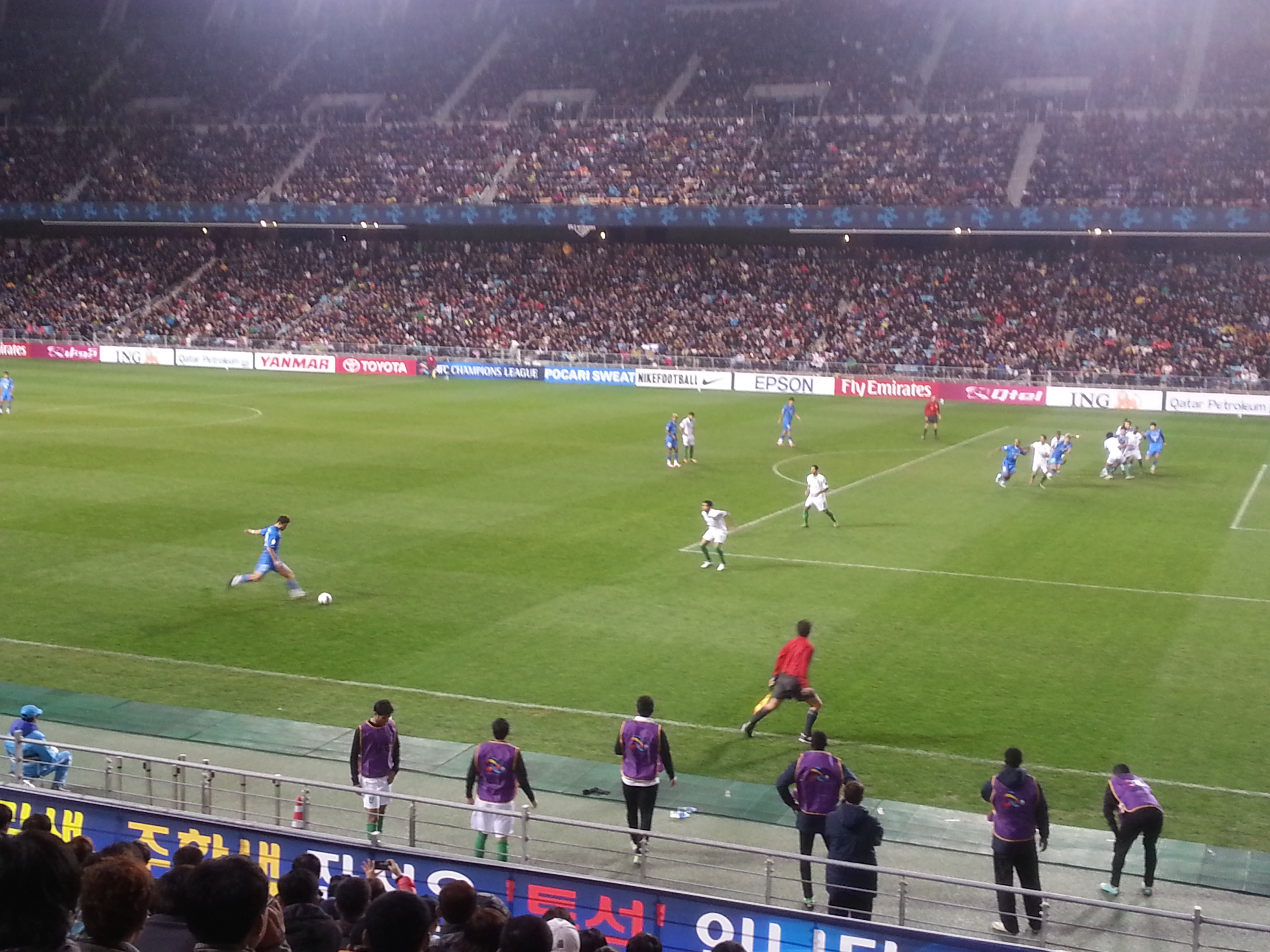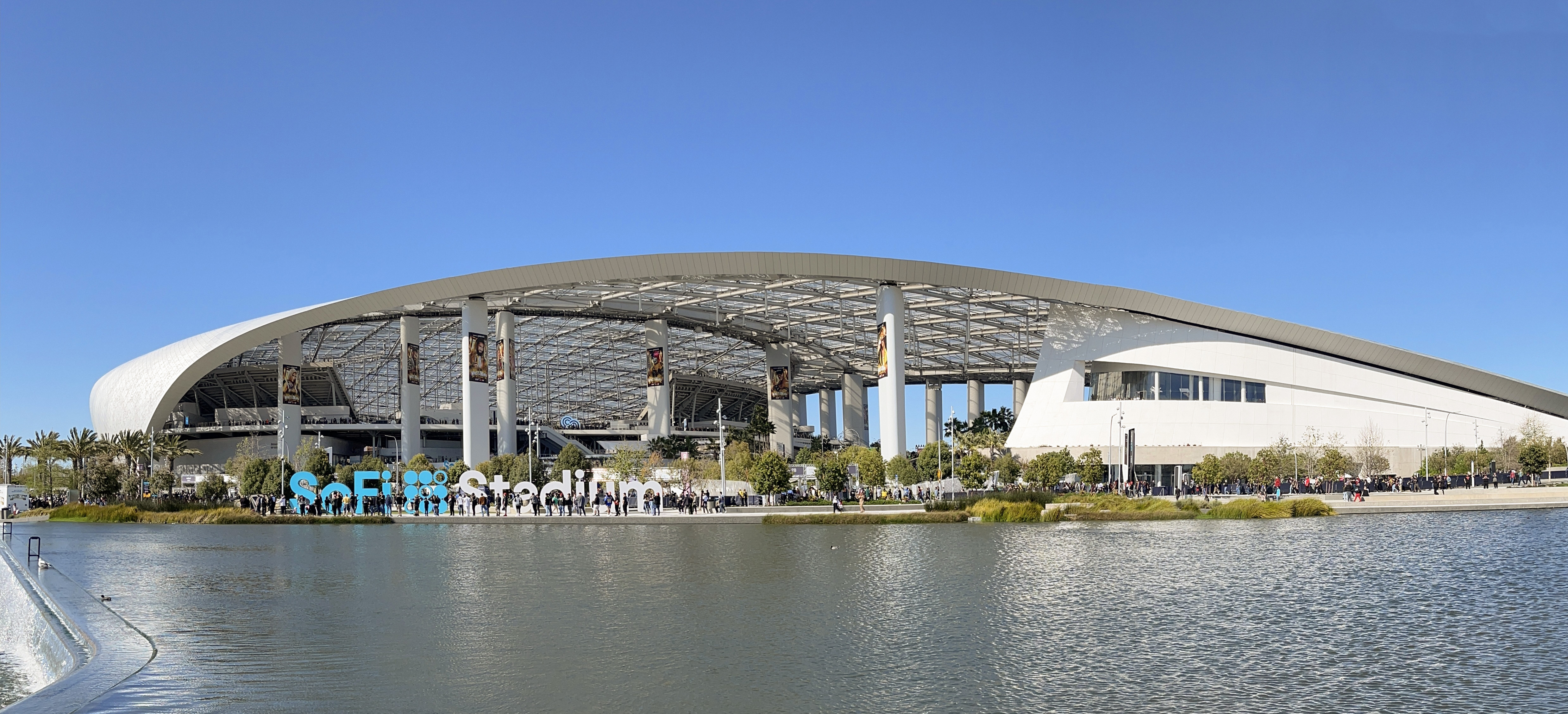|
Ulsan Complex Stadium
Ulsan Stadium is a multi-purpose stadium located in Ulsan Sports Complex, Ulsan, South Korea. Originally, there was Ulsan Civic Stadium at the same location which opened in 1970. The original stadium was demolished in 2003 and replaced with Ulsan Sport Complex. Ulsan Sports Complex consists of the Ulsan Stadium and Dongchun Gymnasium. Ulsan Stadium is a multi-purpose stadium which is mainly used for football; it was the home ground of the Ulsan Hyundai FC, Ulsan Hyundai before they moved to Ulsan Munsu Football Stadium in 2001 and was the home stadium of Ulsan Hyundai Mipo Dolphin FC, Ulsan Hyundai Mipo Dockyard between 2005 and 2016. The stadium has a capacity for 19,471 spectators. See also *Ulsan Civic Stadium External links Official website World Stadiums profile Athletics (track and field) venues in South Korea Football venues in South Korea Multi-purpose stadiums in South Korea Sports venues in Ulsan Sports venues completed in 2005 K League 1 stadiums {{SouthKorea-s ... [...More Info...] [...Related Items...] OR: [Wikipedia] [Google] [Baidu] |
Ulsan Sports Complex1
Ulsan (; ), officially the Ulsan Metropolitan City, is South Korea's seventh-largest metropolitan city and the eighth-largest city overall, with a population of over 1.1 million inhabitants. It is located in the south-east of the country, neighboring Busan to the south and facing Gyeongju to the north. Ulsan is the industrial powerhouse of South Korea, forming the heart of the Ulsan Industrial District. It has the world's largest automobile assembly plant, operated by the Hyundai Motor Company; the world's largest shipyard, operated by Hyundai Heavy Industries; and the world's List of oil refineries#(World's largest refineries), third largest oil refinery, owned by SK Energy. In 2020, Ulsan had a GDP per capita of $65,352, the highest of any region in South Korea. Ulsan is the city that built the first automobile hydrogen charging station in the country in 2009. In addition, the first hydrogen ship charging station in the country was installed in Jangsaengpo Port in 2021. Current ... [...More Info...] [...Related Items...] OR: [Wikipedia] [Google] [Baidu] |
Ulsan Hyundai Mipo Dolphin FC
Ulsan Hyundai Mipo Dockyard Dolphin Football Club () was a South Korean football club based in Ulsan. The club competed in the Korea National League between 2003 and 2016 and was owned and operated by Hyundai Mipo Dockyard. They played their home games at the 19,471-capacity Ulsan Stadium. History The club was founded in 1998 as the works team of Hyundai Mipo Dockyard, a global shipbuilding company, and joined the Korea National League in 2003. They have won the National League seven times (2007, 2008, 2011, 2013, 2014, 2015 and 2016). After the 2016 season, Hyundai Mipo Dockyard announced that they would no longer fund the team, and the club was subsequently dissolved. Honours * Korea National League **Winners (7): 2007, 2008, 2011, 2013, 2014, 2015, 2016 * Korean FA Cup **Runners-up (1): 2005 * Korea National League Championship **Winners (3): 2004, 2011, 2016 **Runners-up (4): 2006, 2010, 2012, 2015 * Korean National Football Championship **Winners (1): 2000 * Korean Pr ... [...More Info...] [...Related Items...] OR: [Wikipedia] [Google] [Baidu] |
Ulsan Hyundai FC
Ulsan HD FC (), formerly Ulsan Hyundai FC, is a South Korean professional Association football, football club based in Ulsan that competes in the K League 1, the top tier of South Korean football. Founded in 1983 as Hyundai Horang-i, they joined the K League in 1984. Their home ground is Ulsan Munsu Football Stadium. The club is owned by HD Hyundai Heavy Industries. Ulsan HD have won the league title five times, most recently in 2024 K League 1, 2024, and the Korean FA Cup once, in 2017 Korean FA Cup, 2017. At the international level, they have won the AFC Champions League twice, in 2012 AFC Champions League, 2012 and 2020 AFC Champions League, 2020, and are the only club to have won the tournament twice without defeat. History Early years: before Ulsan (1983–1989) The club was founded on 6 December 1983 as Hyundai Horang-i, with tiger as its mascot (horangi means tiger in Korean). Their original franchise area was Incheon and Gyeonggi Province. They joined the professional K ... [...More Info...] [...Related Items...] OR: [Wikipedia] [Google] [Baidu] |
Ulsan Citizen FC
Ulsan Citizen Football Club () is a South Korean association football, football club based in the city of Ulsan. The club plays in the K3 League, the third tier of football in South Korea. Following the club's foundation in 2018, it joined the K3 League Basic in the 2019 K3 League Basic, 2019 season, and was promoted to the rebranded K3 League in 2020 after finishing as runners-up in the inaugural season of the K4 League. Honours *K3 League Basic **Winners (1): 2019 K3 League Basic, 2019 *K4 League **Winners (0): **Runner-up (1): 2020 K4 League, 2020 Season by season records Current squad ''As of 2 July 2022'' See also * List of football clubs in South Korea References K3 League clubs K4 League clubs K3 League (2007–2019) clubs Sport in Ulsan Association football clubs established in 2018 2018 establishments in South Korea {{SouthKorea-footyclub-stub ... [...More Info...] [...Related Items...] OR: [Wikipedia] [Google] [Baidu] |
Multi-purpose Stadium
A multi-purpose stadium is a type of stadium designed to be easily used for multiple types of events. While any stadium could potentially host more than one type of sport or event, this concept usually refers to a design philosophy that stresses multifunctionality over speciality. It is used most commonly in Canada and the United States, where the two most popular outdoor team sports—Canadian football or American football and baseball—require radically different facilities. Football uses a rectangular field, while baseball is played on a baseball field, diamond with a large outfield. Since Comparison of American and Canadian football#Playing area, Canadian football fields are larger than American ones, the design specifications for Canadian facilities are somewhat less demanding. The particular design to accommodate both is usually an oval, although some later designs use an octorad. While building stadiums in this way means that sports teams and governments can share costs ... [...More Info...] [...Related Items...] OR: [Wikipedia] [Google] [Baidu] |
Sports Complex
A sports complex is a group of sports facilities. For example, there are track and field stadiums, football stadiums, baseball stadiums, swimming pools, Olympic Parks, and indoor arenas. Asia * Azadi Sport Complex * Cebu City Sports Complex * Dasana Indah Sport City * Davao City–UP Sports Complex * Davao del Norte Sports Complex * Deli Sport City * Doyo Baru Sport Complex * Gelora Bung Karno Sports Complex * Gelora Bung Tomo Sports Complex * Rizal Memorial Sports Complex * Jerusalem Sports Quarter * Jakabaring Sport City * Jalak Harupat Sports Complex * JRD Tata Sports Complex * Kai Tak Sports Park * Kalinga Stadium * Lukas Enembe Sport Complex * Malaysia National Sports Complex * Marikina Sports Center * Mimika Sport Complex * Nanjing Olympic Sports Center * New Clark City Sports Complex * Olympic Green * Panaad Park and Sports Complex * Rawamangun Sports Complex * Shree Shiv Chhatrapati Sports Complex * Setia SPICE * Seoul Sports Complex * Siliwangi Spo ... [...More Info...] [...Related Items...] OR: [Wikipedia] [Google] [Baidu] |
Ulsan Civic Stadium
Ulsan Public Stadium was a multi-purpose stadium located in Ulsan, South Korea. In 2003, the city of Ulsan demolished the stadium and built the Ulsan Sports Complex at the same location. See also * Ulsan Stadium Ulsan Stadium is a multi-purpose stadium located in Ulsan Sports Complex, Ulsan, South Korea. Originally, there was Ulsan Civic Stadium at the same location which opened in 1970. The original stadium was demolished in 2003 and replaced with Ulsan ... References울산공설운동장– Dream stadium of K-League External links Athletics (track and field) venues in South Korea Defunct football venues in South Korea K League 1 stadiums Multi-purpose stadiums in South Korea Sports venues in Ulsan Sports venues completed in 1970 Sports venues demolished in 2003 {{SouthKorea-sports-venue-stub ... [...More Info...] [...Related Items...] OR: [Wikipedia] [Google] [Baidu] |
Dongchun Gymnasium
Dongchun Gymnasium is a multi-purpose indoor sporting arena located in Jung-gu, Ulsan, South Korea South Korea, officially the Republic of Korea (ROK), is a country in East Asia. It constitutes the southern half of the Korea, Korean Peninsula and borders North Korea along the Korean Demilitarized Zone, with the Yellow Sea to the west and t .... The capacity of the arena is 5,831. It was opened in January 2001 after several setbacks and problems with its construction. External linksOfficial website Sports venues completed in 2001 Indoor arenas in South Korea Sport in Ulsan Basketball venues in South Korea Buildings and structures in Ulsan 2001 establishments in South Korea {{SouthKorea-sports-venue-stub ... [...More Info...] [...Related Items...] OR: [Wikipedia] [Google] [Baidu] |
Ulsan Munsu Football Stadium
The Ulsan Munsu Football Stadium () is a association football, football stadium in Ulsan, South Korea with a capacity for 37,897 spectators. Since 2001, it has been the home ground of K League 1 team Ulsan HD FC, Ulsan HD. The stadium was built from 18 December 1998 to 28 April 2001 at a total cost of 151.4 billion South Korean won, won (US$116.5 million). International matches The venue hosted three matches at the 2002 FIFA World Cup. See also *List of football stadiums in South Korea References External links Ulsan HD FC official website World Stadiums (archived 3 February 2009) {{Authority control Ulsan HD FC Venues of the 2002 Asian Games Football venues in South Korea Sports venues in Ulsan Sports venues completed in 2001 2001 establishments in South Korea K League 1 stadiums ... [...More Info...] [...Related Items...] OR: [Wikipedia] [Google] [Baidu] |
Athletics (track And Field) Venues In South Korea
Athletics may refer to: Sports * Sport of athletics, a collection of sporting events that involve competitive running, jumping, throwing, and walking ** Track and field, a sub-category of the above sport * Athletics (physical culture), competitions based on human qualities of stamina, fitness, and skill ** College athletics, non-professional, collegiate- and university-level competitive physical sports and games Teams * Athletics (baseball), an American professional baseball team currently based in West Sacramento, California, with no city designation, previously known as: ** Philadelphia Athletics (1901–1954) ** Kansas City Athletics (1955–1967) ** Oakland Athletics (1968–2024) * Philadelphia Athletics (1860–1876), an American professional baseball team * Philadelphia Athletics (American Association), an American professional baseball team, 1882–1890 * Philadelphia Athletics (1890–1891), an American professional baseball team * Philadelphia Athletics (NFL), an Americ ... [...More Info...] [...Related Items...] OR: [Wikipedia] [Google] [Baidu] |
Football Venues In South Korea
Football is a family of team sports that involve, to varying degrees, kicking a ball to score a goal. Unqualified, the word ''football'' generally means the form of football that is the most popular where the word is used. Sports commonly called ''football'' include association football (known as ''soccer'' in Australia, Canada, South Africa, the United States, and sometimes in Ireland and New Zealand); Australian rules football; Gaelic football; gridiron football (specifically American football, arena football, or Canadian football); International rules football; rugby league football; and rugby union football. These various forms of football share, to varying degrees, common origins and are known as "football codes". There are a number of references to traditional, ancient, or prehistoric ball games played in many different parts of the world. Contemporary codes of football can be traced back to the codification of these games at English public schools during the 19th ... [...More Info...] [...Related Items...] OR: [Wikipedia] [Google] [Baidu] |



